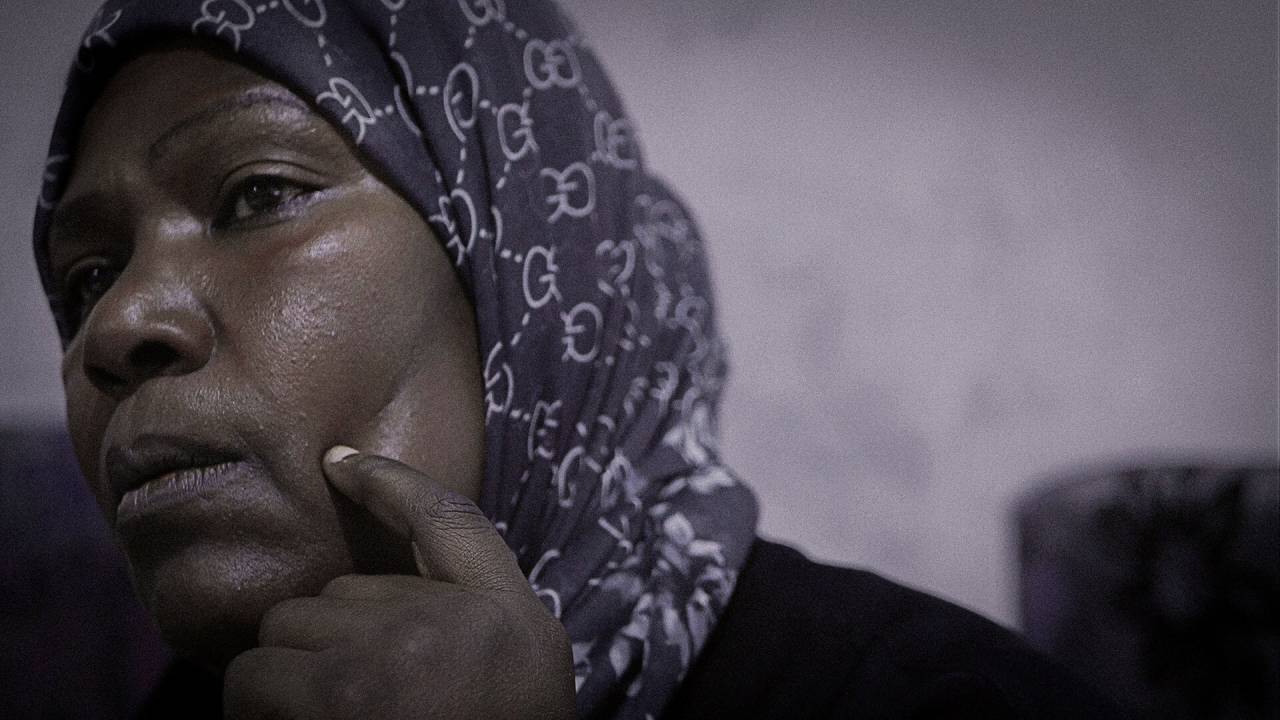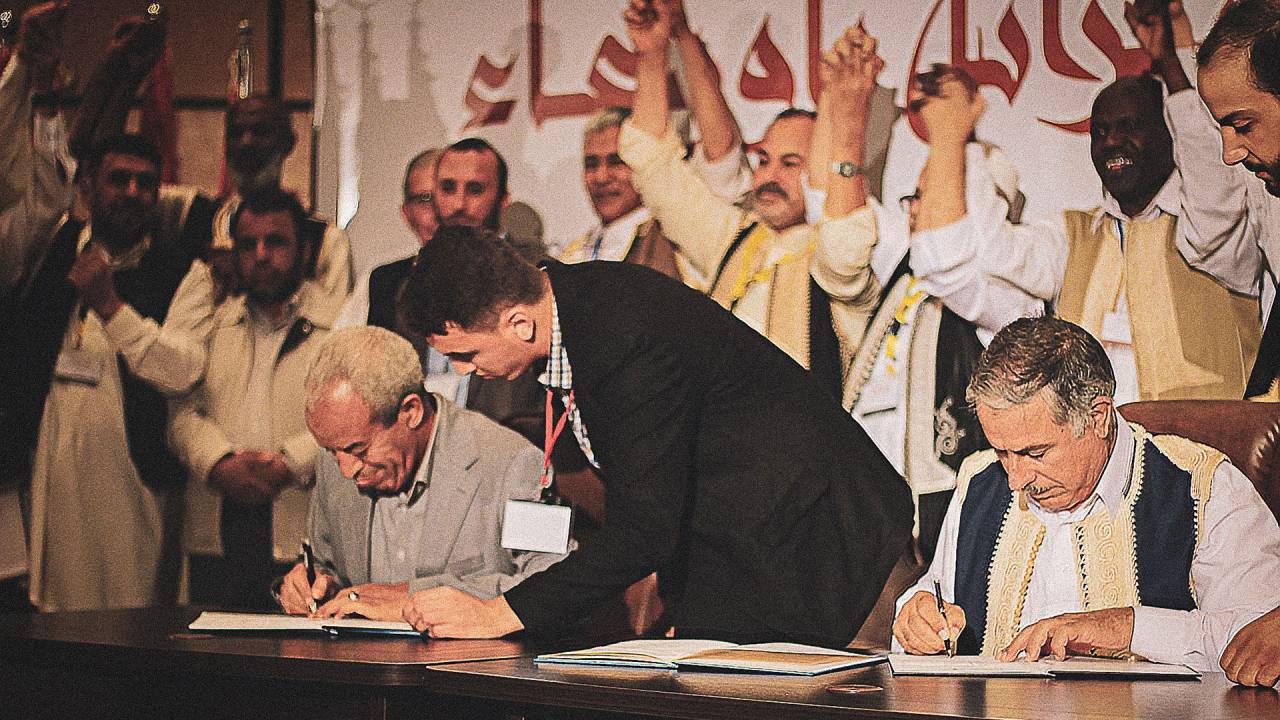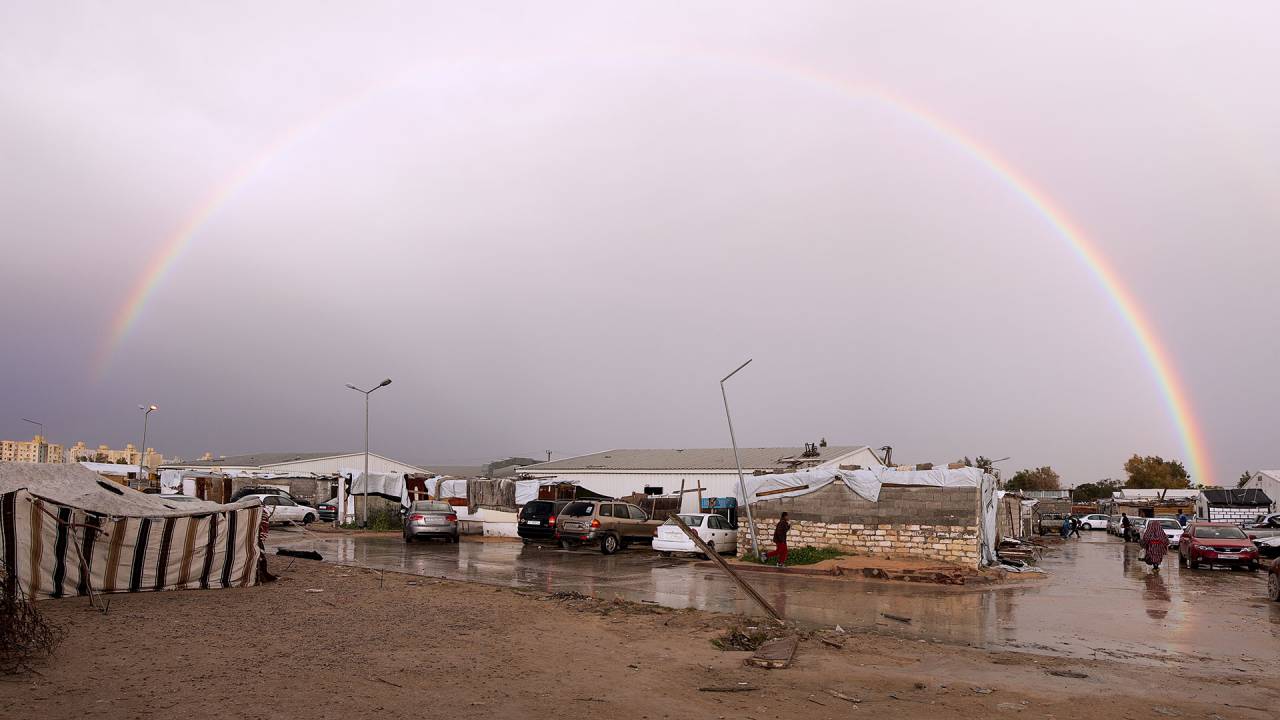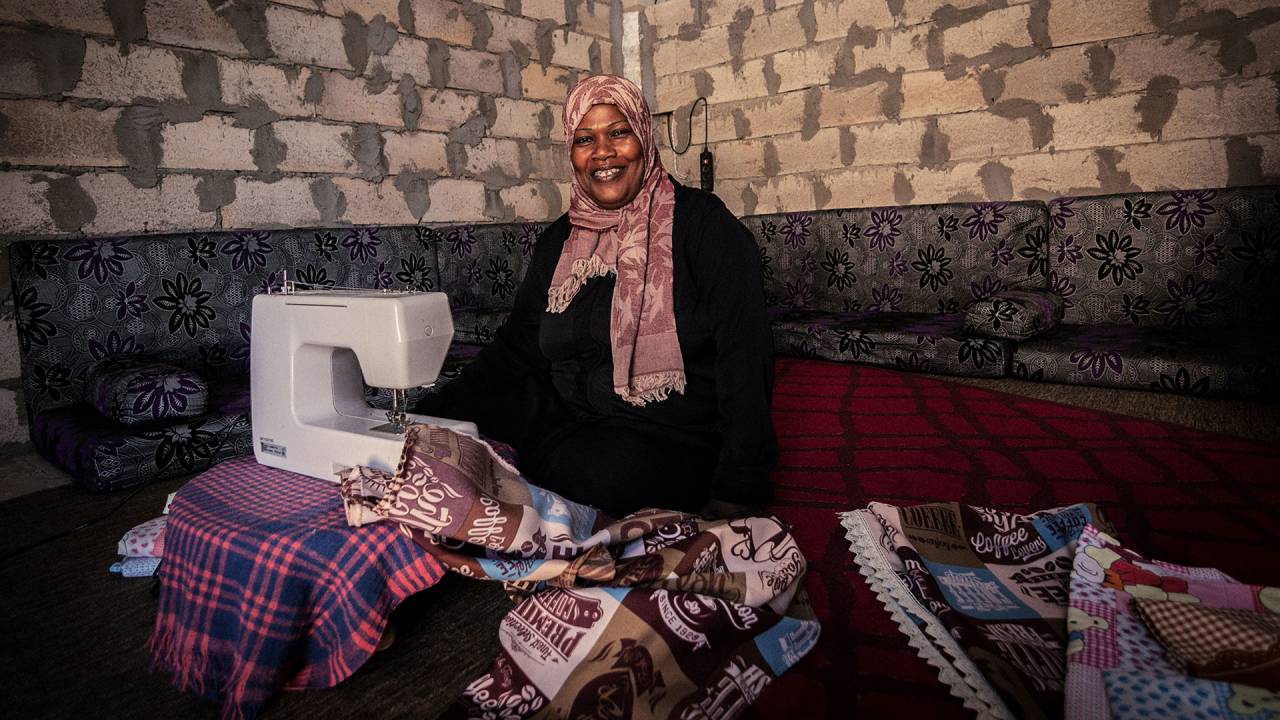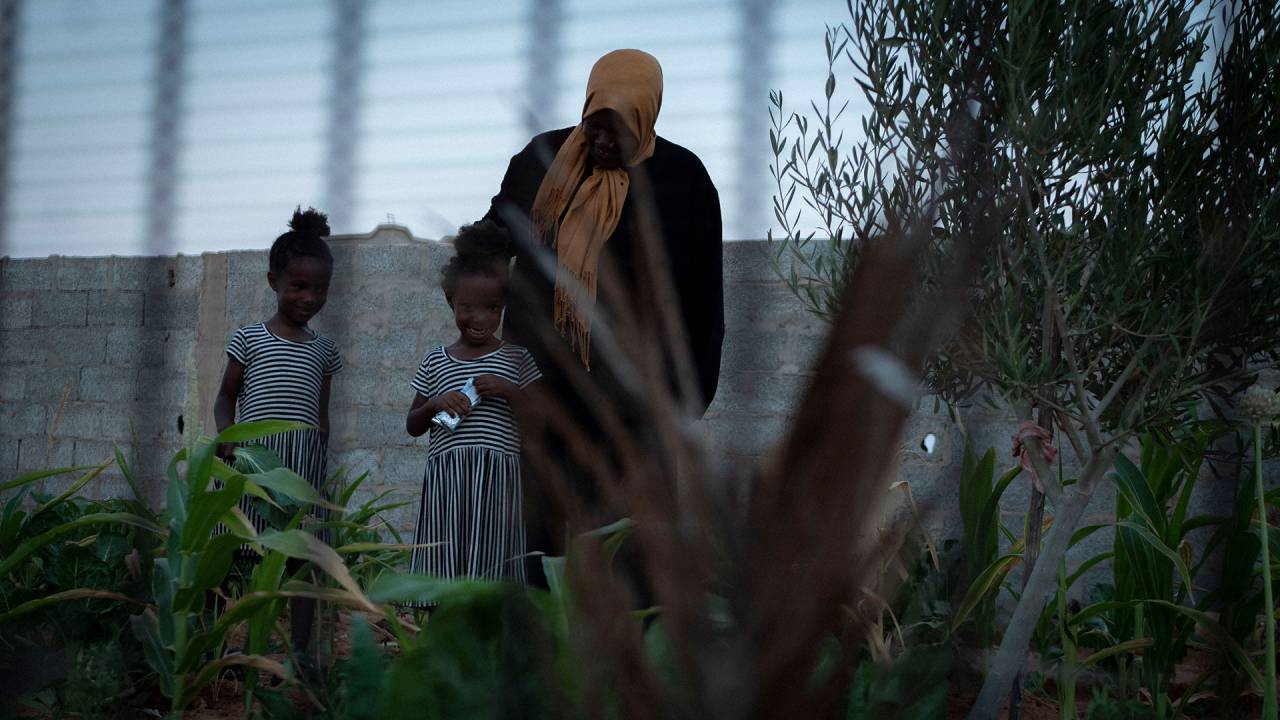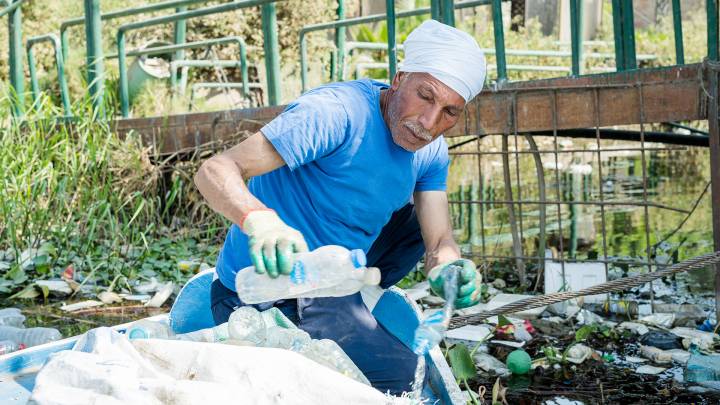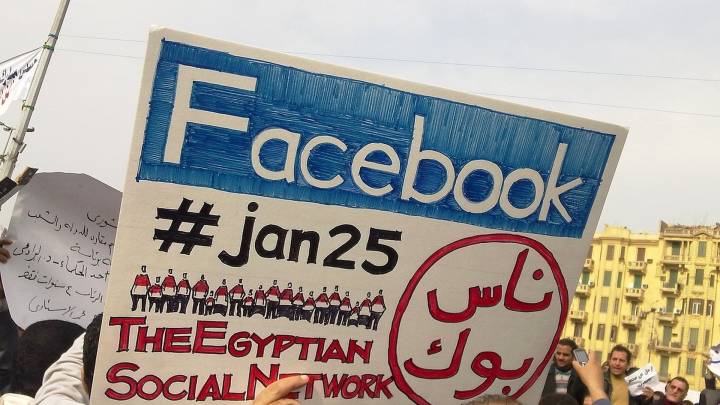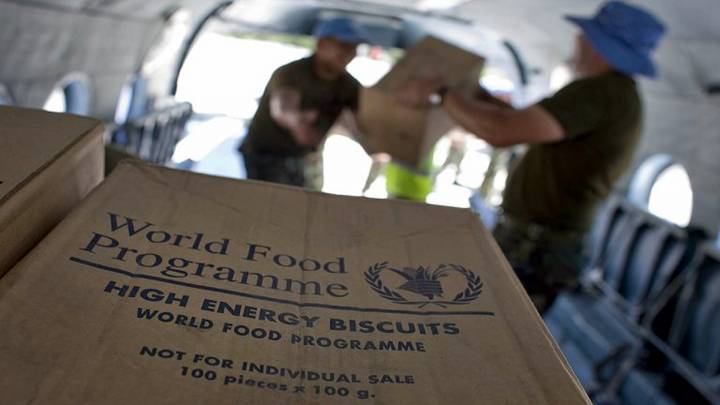During the war, their cities of Misrata and Tawergha were on warring sides. Now, an initiative led by a group of women could become a model for all of Libya.
The experience of homelessness and poverty, especially if endured over long periods of time, has a dramatic impact on the psychosocial well-being of individuals and communities. This has been the experience of Bayda Misbah Omar, a 47-year-old housewife, passionate needlewoman and mother of two girls. Before the revolution, she lived a simple, stable and safe life with her family in Tawergha, where she worked for a sewing and embroidery company. She was ambitious and hoped to set up her own weaving workshop to build a good life for her family. But then the revolution turned their lives into a seemingly endless nightmare.
The Libyan Revolution of 17 February, 2011 rose against the dictatorship of Muammar al-Gaddafi, but was followed by a series of civil wars in many regions and cities between the revolutionaries and the regime’s loyal brigades.
Some of the bloodiest clashes took place in the city of Misrata, in north-central Libya. Here, it took eight months for the revolutionaries to defeat Gaddafi’s troops and reach the capital, Tripoli. In those grim months of fighting, the regime took advantage of Misrata’s neighbouring regions, most notably Tawergha, to position its forces and launch missiles at the city. Located only 40km from Misrata and home to about 30,000 people, Tawergha served Gaddafi also to recruit young men to fight against Misrata’s revolutionaries, attack unarmed civilians, and arrest and liquidate opponents of the regime.
These heinous crimes left a gaping wound between the two regions. By the time Misrata gained victory over the regime’s forces, feelings of hate and anger towards the people of Tawergha had consumed Misrata. As a consequence, Tawerghans were expelled from their homes and internally displaced across Libya, often ending up in camps.
A woman’s search for lost stability
Bayda and her family were forced to leave their home, along with all other Tawerghans, and moved to Benghazi, Libya’s second largest city. Surviving on aid for the displaced, Bayda’s husband could not secure a stable salary in the two years they stayed there, so they moved on to Tripoli. Here, they lived in one of the camps for the displaced people of Tawergha.
The makeshift camp was housed in the abandoned buildings of the former Tripoli Naval Academy. It was by no means family-friendly. Bayda’s family was accommodated in an old office with no door or windows to protect them from the cold sea winds or the violence rampant in the area. Most of all, Bayda feared for her daughters.
“My family and I had a very difficult life during the displacement. At no point did we enjoy stability and peace of mind, although we tried. Life is truly miserable in the camps… Our room was flooded whenever it rained and terribly cold, as there were no windows. Even the door was just a piece of wood leaned up against the opening… We were always afraid that gunmen would assault and rob us, and expected to be thrown out of the place at any moment… I was so scared for my daughters, who were unfamiliar with the area and didn’t go anywhere apart from school”.
Bayda and her family were not granted a decent and peaceful life during their time of displacement. And their suffering did not end there. In July 2016, while Bayda was trying to withdraw her salary from the bank, a fight broke out on the opposite side of the street and she was injured by the ricochet of a bullet. Splinters disfigured her face and she needed special medical treatment which she could barely afford. Plagued more than ever by financial difficulties, she took a job as a cleaner for a private company to keep her family alive.
“I had been wanting to work in weaving and embroidery but could not find a job in that field, and neither could I afford to buy a sewing machine. So I was forced to work in the lowest of jobs to provide my family with an income that we could live on. My greatest concern was that my daughters would not go to bed hungry.”
Bayda’s desperate attempts to create a sense of stability and peace for her family were hampered by worsening circumstances. After the injury, she broke down. She hated her life and was overcome by despair and hopelessness. It was a very dark time; she suffered from mental illness and depression, unable to see any solution other than to wait patiently until God changed her destiny for the better.
Bayda’s difficult path had not begun with the Libyan revolution. The roots of her trauma reached back to her childhood, and the bullying and racism of her classmates. They claimed she could not bear the name Bayda (‘white’), since she had brown skin. “The situation was very painful, and I began to call myself Layla [‘night’] instead of Bayda.”
Women peacemakers and the Reconciliation Pact
Mounting pressure at local and international level towards the end of 2015 led to increasing mediation attempts between Misrata and Tawergha. Most of them failed, until each side formed a Dialogue and Reconciliation Committee consisting of local council members that would represent the parties in peace negotiations. The Reconciliation Pact announced in Misrata on 3 June, 2018 provided for the return of the people of Tawergha to their former home. The past was to be put behind them for the sake of national unity and stability.
Bayda says, “When the reconciliation was announced, we were very happy, and I decided to return to my land. We and 14 other families were the first ones to come back to Tawergha in search for a stable life… Well, we came back to houses destroyed and burned, practically uninhabitable. We stayed in a school until the town was functioning again in terms of water supply, electricity and services providers like health centres, shops, schools and others… We were scared of attacks, so at night Tawergha was like a ghost town. It was a difficult time that more than ever exhausted me mentally.”
The reconciliation committees were not alone in their mission to restore peace between the two regions. A group of activist women, the Women’s Peace Team, worked hard to support their people, especially other women. Among them were Asya Al-Shuwaidi from Misrata and Amal Baraka from Tawergha.
Coincidence and friendship brought these two women together when they needed each other, both looking for someone who could identify with their pain and who believed in the same future cause, someone with the same ambitions and goals that would set them on a common path.
During the offensive on Misrata, Asya’s house had been right on the front line and was destroyed by Gaddafi’s troops, which forced her to leave until the liberation of the city. Amal had been displaced and lived in Tripoli from the beginning of the revolution until the signing of the Reconciliation Pact. Both were convinced that the division of Libyan communities in the wake of the civil wars was wrong, and made it their mission to reunite and empower them.
Before the revolution, Amal and Asya had great aspirations. Amal, 48 years old, had always wanted to start a business in Tawergha, just like her father, who used to encourage her. Her friend Asya from Misrata, a 45-year-old mother of two who was passionate about sports, wished to become a coach and establish a sports club. Their lives were derailed by the February 2011 revolution and the following civil wars, when both fled their homes.
The Women’s Peace Team Tawergha-Misrata was founded in May 2018 at the office of the Minister of State for Migrants and Displaced Persons, Yousef Jalalah. Amal and Asya were among the initial core members.
Amal and Asya recall: “Even though 3 June, 2018 was in the middle of Ramadan, the announcement of the Reconciliation Pact went ahead. Only men attended, not a single woman, even though womens’ voices and roles had been important in making this day possible. We had brought women from both sides together in dialogue sessions to support their return and to build their confidence and sense of safety. Our group was a tributary stream to the river that helped to drive forward the reconciliation process led by men.”
Amal and Asya then describe how they met: “One day we were at the airport to go on different business trips. At the time, we were looking for a woman from the other side whom we could work with on creating peace of all kinds. Our main condition was that she had to be affected by the wars in some way, so she would believe in what we wanted to do… And although it was somewhat difficult, we stumbled across each other that day. We talked a lot and started working together as soon as we were accredited as the Women’s Peace Team Tawergha-Misrata by the Ministry for Migrants and Displaced Persons.”
In order to restore social peace between their communities and to help the people of Tawergha settle in, Amal and Asya have led numerous initiatives. Most notably, they visited the first child born in Tawergha after the return of its people, bearing gifts from the people of Misrata. Their efforts have also contributed to reducing the life sentences or commuting the death sentences of some prisoners, a number of whom have been released.
Forging solidarity and reconciliation in the Tomina Centre
The Reconciliation Pact also pledged the establishment of mental health and family centres in Misrata and Tawergha to rehabilitate those traumatised by homelessness, violence and imprisonment during the wars. Appreciating the female capacity of empathy with others, especially when sharing similar painful experiences, the reconciliation committees decided that women should run those institutions. Hence, the Tomina Mental Health and Family Support Centre was founded with local and international support in the village of Tomina, which links Misrata and Tawergha.
The Misrata local council, for its part, dedicated a building to accommodate the new Centre, while the Misrata Reconciliation Committee appointed competent people to staff it. Asya took a position in its administration. Amal Saffar, a woman she had worked with in the Misrata Dialogue and Reconciliation Committee, became the director. Since the revolution, Asya had been one of the most proactive women from her region in promoting peace, devoting her initiative to the Sustainable Development Goals in Libya.
Amal Saffar had experienced great suffering during the wars and was among those now calling for dialogue and peace. Moreover, she brought to the table invaluable experience in the social field, having worked for the General Authority for the Social Solidarity Fund during the Gaddafi era, first as head of the Women’s Affairs Commission, then the Social Affairs Commission. However, because of her work for Gaddafi before the revolution, despite her having been arrested and tortured by his men later on, the two parties in conflict were suspicious of her. In the past, the people of her town had accused her of being loyal to the Gaddafi regime, but when she had later refused to express her support for Gaddafi, she became a traitor in the eyes of his followers, as well. They assaulted and arrested her entire family. Her torturers did not show mercy in light of her pregnancy and treated her with utmost cruelty.
Asya recalls meeting Amal Saffar: “When Youssef Zarzah, Head of the Dialogue and Reconciliation Committee for Misrata, learned of the peace-building efforts of women and that I was elected to represent the central region in drafting the women’s document of social peace, he summoned me to introduce me to Ms Saffar. He wanted us to represent women in the dialogue and reconciliation with Tawergha. With someone by my side who had endured so much pain in wartime but was still calling for peace, our message would have a greater impact on the other party.”
Asya continues: “It is easier to ignite a war than to bring about social peace… Restoring things as they were before, including trade and social relations, is a very difficult task. We are therefore always calling for an end to war… War can never be pretty. It is always ugly and destructive for societies. This is where we came up with the idea of mental health and family support centres for both regions, which could provide psychosocial support to people in need, be it because of their long time in exile as in the case of the Tawerghans, like Ms Bayda, or because they became prisoners during the clashes, such as Ms Saffar.”
Bayda joined the social support programme in the Tomina Centre after her relatives had found it beneficial. “I learned about the Tomina Centre from my brothers,” she explains. “They pressured me and insisted I should go, because they thought that I was in dire need of help. So, I went. After all, it wouldn’t hurt or make things worse.”
At the time, Tawergha had not yet set up its Mental Health and Family Support Centre, but Amal Baraka and her team of women were working with the local Reconciliation Committee under the direction of Abdel Nabi Abu Orraba, and were providing services similar to the Tomina Centre with the limited possibilities they had. As coordinator of the Tawergha Psychosocial Support Team, Amal assisted returnees to settle in and build a stable life. In addition, she encouraged those still displaced in camps or homeless to return to Tawergha.
Amal Baraka stresses, “Since the beginning of the crisis that has befallen the people of Tawergha, my team has not rested to help and support the people and make our contribution to peace between the two regions, with the aim of reconciliation and restoring stability in Tawergha. The path towards stability is hard and requires a lot of time and support, particularly psychosocial support. The percentage of people with mental health problems is very high, especially among women and children, because of what happened to them during the displacement and war. It needs a lot of work to restore their balance. We organise mental health sessions, lectures or social events and programmes on our own initiative to achieve this. There is no designated location and suitable environment where we can offer our programme… It would help us a lot if there were.”
The Tomina Centre has received international support from the Italian Embassy and the United Nations Development Programme (UNDP), through the Stabilisation Facility for Libya (SFL), in the context of achieving the Sustainable Development Goals in Libya. This has enabled the development of the Centre’s infrastructure, full maintenance, renovation and fit-for-purpose equipment of its building, as well as the provision of training in the three key specialisations of its services – sociology, psychology and mental health. The SFL has also supported a number of local organisations that provide social development programmes, such as Atwar for Research and Community Development, with a view to a future partnership with the Tomina Centre.
Asya Al-Shuwaidi says, “We are helping the people of Misrata to rethink what they consider injustice towards them, and are supporting Tawerghans to overcome their fears of the people of Misrata. Bit by bit, the water will return to its streams and we will re-establish the social bond and peace between the two regions.”
“To be honest, I was hesitant at first,” Bayda admits. “I was scared and isolated myself from others, especially the people of Misrata… I could not bring myself to sit with them and join their conversation after everything that had happened between our two regions. But gradually I adjusted, and our joint activities did the rest to break the ice between us. I discovered that what I thought of them was wrong. They were really kind… The world is ever changing, and we are all Libyans at the end of the day. We must be like brothers and sisters and support each other.”
She adds: “I attended training sessions for two months which focused on psychological support and combating hate speech. We found them all very useful and enriching. Also, the atmosphere in the Centre was caring and made me feel very comfortable. I felt like I was with family.” With the help of the state and local authorities, the Tomina Centre could do an even better job at establishing a new culture and restoring stability in the communities concerned.
Asya confirms that “the door of the Centre is always open for partnerships with other institutions, both international and local, to work on common goals. Without the support by UNDP and the Italian Embassy, our mission would have been much harder. We have already worked with local institutions such as Atwar and international organisations such as Relief International, and yielded some great results thanks to that. On the other hand, the state is hardly interested in such initiatives. We have so far provided psychosocial support to around 200 children from all neighbouring areas. The goal was to make them feel safer and inspire amity and affection for each other. We have also trained 80 women from different areas with the aim to break the ice between them, restore social peace and encourage entrepreneurship, among other things.”
Goodbye, Leyla…
Thanks to the training at the Tomina Centre, but also her own strong will to secure a better life for her family, Bayda has gradually regained her confidence and tackled the mental health problems that have been haunting her. She eventually felt strong enough to disclose her real name after years of living under a pseudonym to avoid racist stigma and harassment.
There was simply no longer any need to hide behind the name Layla. She told people that her real name was Bayda and that she wanted to be addressed as such from now on. Moreover, she was finally able to start the business she had been dreaming of all along and to reintegrate into society, which infused her with the energy to help other women like her.
“At the end of the training sessions, I felt I was a totally new and stronger person. We trainees became partners afterwards. For example, one of the ladies from Misrata gave me a sewing machine for my work, and I in turn helped her with the marketing of her sweets in Tawergha.”
After long years of wishing and waiting, Bayda used the new sewing machine to open a weaving and embroidery business. She was finally able to achieve a level of financial independence and balance of mind.
“Through my work I could save some money to support my husband in providing for our basic needs. As time went by, we were able to move from the temporary shelter at the school to our own place… We had built a very small, modest house on my husband’s land. Even though its roof was made of iron sheets, as the building used to be a garage, we felt comfortable. And for the first time in a very long while, we experienced stability and peace… Next to our house, we have also planted a small vegetable garden, which provides us with basic ingredients for the kitchen.”
Since the people of Tawergha returned, no assaults or other crimes have been reported. People seem to have found a safe haven yet again in the region. “Now that my small weaving business has given my life some security, I am eager to expand it and set up a sewing workshop. I also want to build a decent house for my family,” Bayda says.
Amal Baraka continues to look after the women of Tawergha in her new role as Head of the Unit for Women’s Affairs in the local council. She supports them in starting businesses, creating jobs or developing their talents and skills, for example in traditional crafts, in order to increase their income and ensure a decent life for themselves and their families. To that end, she recently selected Bayda for an intensive training camp in weaving and embroidery for women, facilitated by experts in private sector development and entrepreneurship.
Amal says: “I have been following Bayda’s life. She and her family were among the first to return to Tawergha, struggling, settling in and ultimately bringing up their children in safety. She has changed so much since her arrival in Tawergha… She used to be withdrawn and scared. Now she is strong, open and always smiling. She always asks me if there is someone who needs help… She is very sympathetic to the suffering of others, because of what she lived through herself, and tries hard to help them. Today she is an important member of the Tawergha women’s team. With God’s help, she will certainly have a good life and thrive on the opportunities she is given.”
With peace and stability returning to Tawergha and Misrata, Asya and Amal have also been pursuing their aspirations recently. Asya has opened a women’s sports club, which she sometimes uses for awareness-raising events for women from the area. As for Amal, her keenness to rebuild the foundations of a normal life in Tawergha prompted her to open its first clothes shop.
Revolution, war… and pandemic
Unfortunately, the Tomina Centre’s services have come to an almost complete stop since the World Health Organisation (WHO) declared COVID-19 a global pandemic in March 2020. Libya followed most other countries in imposing precautionary measures, such as a curfew and social distancing. This comes at a time where Bayda sees “an urgent need for the psychosocial support programme. The war has affected the mental health of all those close to me, and they need it to turn their lives around.”
Asya points out: “The training methods we use rely fundamentally on the live interaction between trainees and with the trainer. For several reasons, it is difficult to replace them with alternatives like online learning. Unfortunately, fears of spreading the coronavirus and our obligation to comply with the preventive measures have hampered our mission. We have received numerous requests in recent times from people who wish to enrol in the Centre’s programme… If this situation lasts much longer, it will have dramatic consequences for communities seeking stability and change.”
In the whole of Libya, the Tomina Centre remains the only institution offering psychosocial support services. Its capacities are insufficient to assist the large number of people whose lives and mental health have been affected by the armed conflicts that have ravaged most of the country. It is imperative that the Centre be joined by many more institutions in providing individuals and communities with the care and guidance they need to mend their psychological scars and, in doing so, doubtlessly contribute to the stability of communities and the country as a whole.
The Tomina Centre should be seen as a model to emulate and roll out in traumatised communities across Libya and beyond. In the meantime, nothing, not even a pandemic, can stop the Tomina Centre from helping those in need.
The research for this article was supported by the Candid Foundation’s journalism grant.

